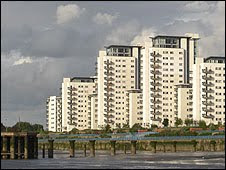
Whoever chose the locations and archive footage for Synth Britannia, a fine BBC documentary on the UK synthpop moment, either really knows their stuff, or has been lurking round here. In the first few minutes there's Thamesmead, Hyde Park/Park Hill in Sheffield*, Hulme Crescents, T Dan Smith's multilevel central Newcastle, later on Basildon and the Lloyds Building, all adding up to - finally! - an explicit acknowledgement of the pop debt to Brutalism without any sociological hand-wringing. For these and many other reasons - Richard H Kirk waxing sinister by the river Don, adroit links between pop and politics, culminating in a smart revisionist argument for Depeche Mode as synthpop's finest anti-Thatcherite entryists** - it's an unexpectedly excellent documentary, everything the enormously disappointing Made in Sheffield should have been and wasn't. Yet, one question which occurred to me when watching it, trying to resist the temptation to just gaze and think 'sigh, those where the days, except for the casual violence and bigotry', was - will there ever be a sound of the decline of the Urban Renaissance? The riverside dromes of most British cities are, as is now becoming clear, the successors to the system-built towers of the 60s, except meaner and cheaper.
Sometimes it all seems rather cyclical. Take for instance, this mildly racist BBC report on fraud in Thamesmead, centring on the negative equity ground zero that is 'The Pinnacles'. The caption to the pic above dubs the buildings 'tower blocks' rather than the more familiar stunning developments or luxury flats. They're emptying out, and becoming fantastically desolate places, as are the business parks and call centres that often accompany them. Yet I can't quite imagine what their sound might be, when in a generation or two they have properly insinuated themselves into our lives, when they've become an accepted part of the city rather than the exclusive enclaves they initially present themselves as, and when people have had the chance to grow up with and in them. At best I could come up with Black Box Recorder's coldly sinister suburbanism, but the aesthetic of postpunk, which fits so neatly the Brutalist fetish for the stark, ambitious and futurist, would seem to jar with this desperately ingratiating style, the sheer relentless jollity of this stuff. I do sincerely hope that the presence of the dromes in Leeds, Manchester and every urban British waterside leads to some interesting new incarnation of musical space, but I wonder if they're powerful enough to elicit the requisite sense of romance and sinister drama. The barcode façades are without the raw power of the concrete panels. The death of Blatcherism lacks the tragedy of the death of Butskellism, and the music may reflect that. We could perhaps imagine a music which sounds like dinner party soundtracks gone curdled and sick, a Hed Kandi compilation appropriated for a post-apocalyptic landscape.
* Gratifyingly, some Sheffield folk seem aware of how important these places are. I recently got sent some copies of Article, an excellent Sheffield zine which features a Sheffield Brutalist Top Five, excepting of course that which has been demolished; and from whence the picture above comes. Think also of the Sesquipedalist's instructive recent comparison of two Sheffield exoskeletons.
** Which might perhaps be linked to the fact that Jeremy Deller seems to be fitting Depeche Mode into his curious counter-narrative of English aesthetic radicalism.



0 comments:
Post a Comment